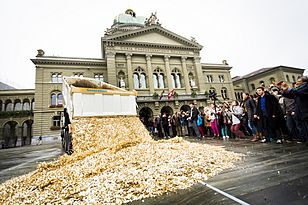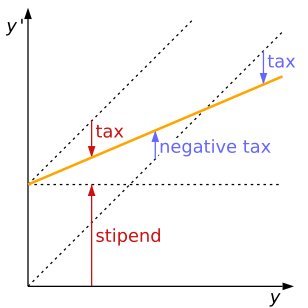Universal basic income facts for kids
Universal basic income (often called UBI) is a plan where everyone in a country or area regularly gets a guaranteed amount of money. This money is given without any conditions, meaning you don't have to prove you're poor or that you're looking for a job. You get it no matter what other money you earn.
If the money is enough to cover your basic needs, like food and shelter, it's sometimes called a full basic income. If it's less than that, it's a partial basic income. No country has fully started UBI yet, but many places have tried it out in small groups, and people talk about it a lot around the world.
Some programs are similar to UBI but have conditions. For example, many countries give money to parents to help with children (called child benefit). Pensions are like a basic income for retired people. There are also programs like Bolsa Familia in Brazil, which helps poor families, or payments made during the COVID-19 pandemic. The Alaska Permanent Fund gives money to all residents of Alaska each year, which some people see as the closest real-life example of UBI.
People have different ideas about UBI. Some worry it would be too expensive or that people would stop working. Others say it could actually save money by simplifying many different welfare programs. They also believe it could make jobs better and give everyone a fair chance to build a good life.
The idea of giving everyone money without conditions has been around for a very long time, even since ancient times. After the Industrial Revolution, when machines changed how people worked, more people started thinking about it. Today, UBI is often discussed when people talk about automation and artificial intelligence (AI). Some wonder if robots and AI will take many jobs, and if UBI could help make sure everyone still benefits from society's wealth.
Contents
How did the idea of UBI start?
Ancient times
Long ago, in 46 BC, the Roman general Julius Caesar gave money to every common Roman citizen. After he died, his will also left money for citizens. Later, Emperor Trajan (who ruled from 98–117 AD) also gave money to Roman citizens who asked for it.
1500s: Early ideas
In 1516, an English thinker named Thomas More wrote a book called Utopia. In his book, he imagined a society where everyone received a guaranteed income. He suggested this idea to stop people from stealing just to get food. He wrote that instead of harsh punishments, it would be better to give everyone a way to live.
A Spanish scholar named Johannes Ludovicus Vives also thought that local governments should make sure everyone had enough to live on. However, he believed people should show they were willing to work to get this help.
1700s: New proposals
In 1797, an English writer named Thomas Spence suggested giving an unconditional basic income to everyone. He thought this money could come from renting out land, with a part of everyone’s earnings going to the state to be given to others.
Another important thinker, Thomas Paine, wrote an essay in 1797 called Agrarian Justice. He proposed a system to end poverty, including pensions for older people and support for those with disabilities. He also suggested payments for young adults. He believed that the earth belongs to everyone, and that those who own land should pay a "ground rent" to the community.
1800s: Sharing land wealth
Henry George suggested creating a system for pensions and disability support, and an unconditional basic income, all paid from the money made from renting out land. He believed this money should be given to people "as a right," not as charity. This idea is sometimes called a citizen's dividend.
Early 1900s: Growing support
Around 1920, more people in England started supporting the idea of basic income.
Bertrand Russell, a famous thinker, believed basic income should be a key part of a new society that combined the best parts of socialism and anarchism.
In the UK, after World War I, a couple named Dennis and Mabel Milner wrote a pamphlet in 1918. They argued that everyone in the UK should get an income every week, without conditions. They felt it was a moral right for everyone to have enough to live on, whether they worked or not.
An engineer named C. H. Douglas noticed that people couldn't afford to buy all the goods being made, even though factories were producing more. He suggested a system called social credit, which included basic income, to fix this problem.
In the 1940s, a British economist named William Beveridge helped create a plan for a new welfare system. One of his committee members, Lady Rhys-Williams, thought that payments for adults should be more like a basic income. She also developed the idea of a negative income tax.
Late 1900s: Political discussions
In 1962, Milton Friedman suggested the idea of a negative income tax (NIT), which is similar to basic income. In the US, President Lyndon B. Johnson started a "war on poverty" in the 1960s, and the idea of a guaranteed income for all Americans became popular. Several experiments with negative income tax were started.
Later, in 1986, the Basic Income European Network (now called Basic Income Earth Network or BIEN) was founded. This group holds conferences to discuss basic income from different viewpoints, like economics and human rights.
2000s: Modern interest
In recent years, the idea of UBI has become even more popular. A vote on basic income in Switzerland in 2016 got worldwide attention, even though it didn't pass. Famous business people like Elon Musk and politicians like Andrew Yang have also supported the idea.
Many cities in the US have started their own small UBI programs. For example, in 2019, Stockton, California, started giving monthly payments to 125 residents. In 2021, Compton, California, and Tacoma, Washington, also started similar programs to help low-income residents.
What's the difference: Basic Income vs. Negative Income Tax?
Imagine you have a flat income tax, meaning everyone pays the same percentage of their earnings in tax.
With a negative income tax, if you earn very little, you don't pay tax. Instead, the government gives you money. As you earn more, the money you get from the government slowly decreases. This is like a way for the government to help people with low incomes.
With basic income, everyone pays income taxes. But everyone also gets the same amount of basic income from the government.
The cool thing is, even though they work differently, the final amount of money you have in your pocket can be the same with both systems! The diagram shows this with the orange line.
However, there are some small differences:
- How it feels: Some people think that getting a basic income feels different from getting a negative income tax, even if the money is the same.
- When you get paid: With basic income, you might get the money upfront. With negative income tax, you might get it later, after your income is calculated.
Why do people talk about UBI?
Automation and jobs
One big reason people support basic income is the idea that automation and robots might take away many jobs in the future. If machines do more of the work, there might be fewer paid jobs for humans. People wonder if UBI could help make sure everyone still benefits from society's wealth, even if they don't have a traditional job. Some even think UBI could be a step towards a world where resources are shared more easily.
Leaders like former US President Barack Obama have said that as artificial intelligence grows, discussions about "unconditional free money for everyone" will become more common.
Money and costs
Some people who support UBI say it could actually help the economy grow. They think it would give people the chance to get more education or start new businesses, because they wouldn't have to worry as much about money.
The cost of UBI is a big question. It depends on how much money each person gets and how the system is set up. Critics worry it would be too expensive. But supporters argue that by replacing many different welfare programs, UBI could save a lot of money on administration and paperwork.
Some experts, like Veronique de Rugy, have even suggested that a UBI system in the US could be cheaper than the current welfare system. Economist Karl Widerquist says it's wrong to just multiply the amount of the grant by the population to figure out the cost, because people would also be paying taxes.
Swiss economist Thomas Straubhaar believes UBI is possible to pay for. He sees it as a way to combine all social support into one simple system. He also thinks it's fair because while everyone gets the same basic income, richer people would pay more in taxes, so poorer people would end up with more money overall.
Prices and rent
One concern about UBI is that it might make prices go up, especially for things like rent and labor. This could lead to inflation. However, things like rent controls could help manage this.
Work and effort
Many critics worry that if people get a basic income, they will work less. This could mean less tax money for the government. Studies have looked at this:
- In some US experiments in the 1970s, people worked about 5% less. This was mostly for people who were not the main earners in a family, like a second parent.
- In a Canadian experiment called Mincome in the 1970s, people worked slightly less. But the biggest changes were for new mothers (who spent more time with their babies) and teenagers (who spent more time in school).
- A study in Iran in 2017 found no evidence that people worked less after a basic income-like reform.
Supporters of UBI argue that it could make unattractive jobs better. If people don't have to work just to survive, employers might have to pay more or improve working conditions to get people to do those jobs.
Fairness and values
Some people argue that it's not fair to give money to everyone, especially if some people choose not to work. They believe that people who work hard shouldn't have to support those who are idle.
However, supporters often see UBI as a basic human right. They believe everyone should have enough money to live a decent life in modern society. It would be like a safety net, making sure no one falls below a certain level of income.
They also argue that UBI could reduce social stigma, which is the negative feeling people sometimes have about those who receive welfare. Plus, people who don't have traditional jobs (like parents raising children or people caring for others) still contribute to society, and UBI could recognize that value.
Health and poverty
Studies have shown that giving unconditional cash (like UBI) to people in poorer countries can make them healthier. One study found that it reduced the chance of people being sick by 27%. It also improved food security and helped children go to school more often. A later study confirmed these findings and also found that it reduced extreme poverty.
The Canadian Medical Association even supported basic income in 2015, saying it could help with health.
Who supports UBI?
Many different people and groups support the idea of universal basic income. This includes politicians, business leaders, academics, and activists from various backgrounds.
Where has UBI been tried?
Since the 1960s, many places have tried out basic income programs. Here are some examples:
1960s–1970s
- Experiments with negative income tax happened in the United States and Canada.
- In the 1970s, the Canadian province of Manitoba tried a program called Mincome. In the town of Dauphin, people worked much less than expected, only about 13% less.
2000–2009
- A basic income grant was tested in Namibia from 2008 to 2009.
- A small basic income project started in São Paulo, Brazil, in 2009.
2010–2019
- From 2011 to 2012, basic income was tried in several villages in India. It was found that young people's education rates went up by 25%.
- Iran started a national basic income program in 2010. It replaced old subsidies for things like gasoline and electricity. In 2012, a single person received about US$40 per month.
- In South Korea, the city of Seongnam started a Youth Allowance Program in 2016. It gave 24-year-olds money every three months to spend in local businesses. This program later grew to cover the whole Province of Gyeonggi.
- The GiveDirectly experiment in Kenya is one of the longest-running basic income trials, helping over 20,000 people.
- A project in Uganda called Eight started in 2017, giving income to adults and children through mobile money.
- The Finnish government ran a two-year basic income pilot from 2017.
- The city of Utrecht, Netherlands, started an experiment in 2017, testing different amounts of aid.
- The Ontario provincial government in Canada launched a basic income pilot in 2017, but it was stopped in 2018.
- In Israel, a non-profit called GoodDollar started in 2018 to use blockchain technology to provide basic income globally.
- The Rythu Bandhu scheme in Telangana, India, started in 2018 to help farmers by giving them money per acre of land twice a year.
2020–present
- In 2020, a Swiss non-profit called Social Income started paying basic incomes to people in Sierra Leone using mobile money.
- In May 2020, Spain introduced a minimum basic income to help fight poverty during the COVID-19 pandemic.
- In Germany, a project called Mein Grundeinkommen started in 2020, giving 1,200 Euros monthly to people chosen by lottery.
- HudsonUP launched in Hudson, New York, in 2020, giving $500 monthly to 25 residents for five years.
- In May 2021, the government of Wales announced a UBI trial for young people leaving care, offering them £1600 per month for three years.
- In July 2022, Chicago started a year-long program giving $500 a month to 5,000 households. Cook County, Illinois also launched a similar program.
Other payments that are similar to UBI
Alaska Permanent Fund
The Alaska Permanent Fund gives money each year to almost all residents of Alaska. This money comes from the state's oil and gas earnings. It helps reduce poverty, especially among older Indigenous people in rural areas. However, the payment isn't enough to cover all basic needs, so it's not always considered a full basic income.
Wealth Partaking Scheme
Macau's Wealth Partaking Scheme also gives some annual money to residents, funded by the city's casinos. But like Alaska's fund, it's not enough to cover basic living expenses, so it's not a full basic income.
Bolsa Família
Bolsa Família is a large social program in Brazil that gives money to many low-income families. It's similar to basic income, but it has conditions. For example, families must keep their children in school.
Other welfare programs
- Pension: Money given to people after they reach a certain age. It's only for older people, not everyone.
- Child benefit: Money given to parents to help with the costs of raising children, usually based on how many children they have.
- Conditional cash transfer: Regular payments given to poor families, but only if they meet certain conditions, like sending their children to school or getting them vaccinated.
- Guaranteed minimum income: This is different from basic income because it's usually only for people who are looking for work, or who have very low savings.
What do people think about UBI?
Many surveys and votes have been held around the world to see what people think about basic income:
- In 2008, a petition for basic income in Germany was accepted, but later called "unrealizable."
- In 2016, Switzerland held the world's first national vote on basic income, but it was rejected by most people.
- Also in 2016, a poll showed that 64% of people in the European Union would vote for basic income.
- In 2017, a US poll found that 43% of Americans supported the idea.
- A 2020 study by Oxford University found that 71% of Europeans now support basic income.
- A 2020 poll by YouGov found that most people in the United Kingdom supported UBI.
- In 2020, a Pew Research Center survey in the US found that 54% of adults were against a federal guaranteed income of $1,000 per month, while 45% supported it.
- A 2021 petition in the US asking for monthly stimulus checks during the COVID-19 pandemic received almost 3 million signatures.
See also
 In Spanish: Renta básica universal para niños
In Spanish: Renta básica universal para niños
- Citizen's dividend
- Economic, social and cultural rights
- Equality of outcome
- Estovers
- FairTax § monthly tax rebate
- Geolibertarianism
- Global basic income
- Happiness economics
- Humanistic economics
- Involuntary unemployment
- Job guarantee
- Left-libertarianism
- Limitarianism (ethical)
- List of basic income models
- Living wage
- Moral universalism
- New Cuban economy
- Old Age Security
- Participation income
- Post-work society
- Quatinga Velho
- Rationing
- Social dividend
- Social safety net
- Speenhamland system
- The Triple Revolution
- Universal Credit
- Universal value
- Universalism
- Wage subsidy
- Welfare capitalism
- Workfare
- Working time
 | Laphonza Butler |
 | Daisy Bates |
 | Elizabeth Piper Ensley |




